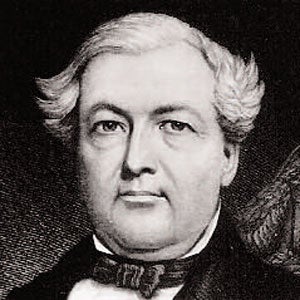Millard Fillmore
13th president - 1850-1853

Succeeding to the office after Zachary Taylor's untimely death, Fillmore was one of the least educated presidents. An apprentice clothier turned lawyer, he had read little apart from the Bible before he was 17 – after which he realised how little he knew, bought a dictionary, and attempted to fill gaps in his vocabulary by studying it. He entered politics as a 24-year-old, initially as a member of the Anti-Masonic Party, and was first elected to Congress in 1833. He was still a relatively obscure figure when selected as vice-presidential candidate – Taylor met him for the first time after his inauguration – and he remained relatively obscure until Taylor's death.
His most significant act as President was to sign into law Henry Clay's Compromise Bill of 1850, which Taylor had opposed. After months of tense debate, before and after Taylor's death, the Compromise package (eventually broken up into five separate bills) admitted California to the union as a free state; granted territorial status to New Mexico; compensated Texas for settling its border dispute with New Mexico; abolished the slave trade in the District of Columbia; and, most controversially, placed Federal officers at the disposal of slaveholders seeking fugitive slaves.
Anger at this last piece of legislation, combined with some backfiring attempts by Fillmore to marginalise opponents within his party, resulted in his missing out on the Whig nomination for 1852. He left office with some bitterness, and, further embittered by the deaths in quick succession of his wife and daughter. As the Whig party disintegrated, he refused to join the nascent Republican party but instead joined the far-right Know-Nothing Party, for which he stood in the 1856 presidential election (winning one state). He continued to dabble in politics thereafter, settling old scores and bemoaning the lack of official provision for the financial well-being of ex-presidents. He supported the Union cause in the Civil War but remained a hate figure for anti-slavery campaigners; a mob vandalised his house after the assassination of Abraham Lincoln. He died of a stroke in 1874.
In his own words
"God knows that I detest slavery, but it is an existing evil, for which we are not responsible, and we must endure it, till we can get rid of it without destroying the last hope of free government in the world."
"The government of the United States is a limited government. It is confined to the exercise of powers expressly granted... and it is at all times an especial duty to guard against any infringement on the just rights of the States."
In others' words
"In his rise from a log cabin to wealth and the White House, Millard Fillmore demonstrated that through methodical industry and some competence an uninspiring man could make the American dream come true."
Official White House biography
"Whether to the nation or to the state, no service can be or ever will be rendered by a more able or a more faithful public servant." John Quincy Adams
"Fillmore lacks pluck. He wants backbone. He means well, but he is timid, irresolute, uncertain and loves to lean." Horace Greeley
"At a time when we needed a strong man, what we got was a man that swayed with the slightest breeze." Harry S Truman
Minutiae
Queen Victoria ( right) thought him the handsomest man she had ever seen.
In 1855, during a visit to the UK, he was offered an honorary degree by Oxford University. He declined it with the words: "No man should, in my judgement, accept a degree that he cannot read." (The text would have been in Latin.)
His first wife, Abigail, died after catching a cold at the inauguration ceremony of his successor, Franklin Pierce.
His last words (presumably in reference to some soup he was being fed), are alleged to have been: "The nourishment is palatable."
It is often alleged that Fillmore installed the White House's first bathtub. This entirely fictitious presidential myth was invented by the humorist HL Mencken in 1917, but is still widely repeated as fact.
Fillmore was the first president to open up trade with Japan, sending a fleet under Commodore Matthew Perry on a mission to make diplomatic and commercial contact.
Join our commenting forum
Join thought-provoking conversations, follow other Independent readers and see their replies
Comments
Bookmark popover
Removed from bookmarks